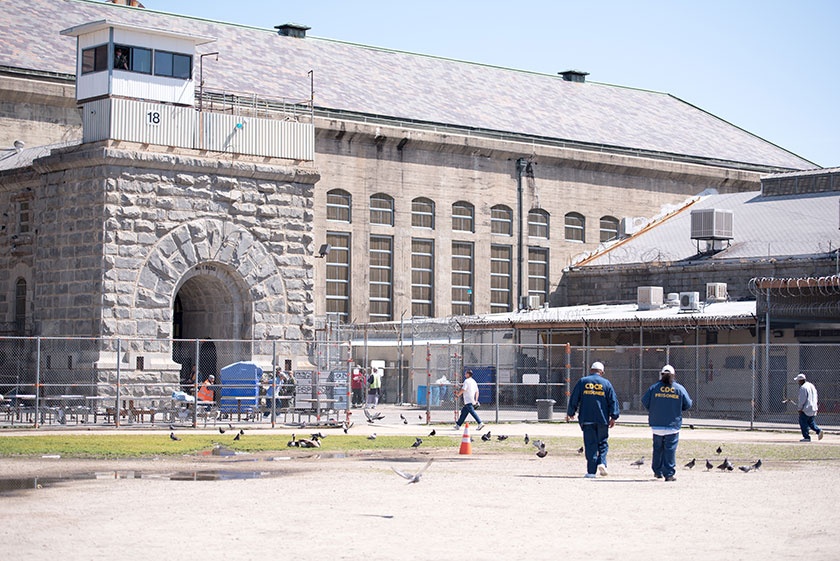California State Prison Sacramento in Folsom one of 9 connected facilities
Two Sacramento men are among those that have been charged in a scheme to use drones to deliver drugs and other contraband into state prisons, according to documents released by U.S. Attorney Phillip A. Talbert.
Rosendo Rene Ramirez, 34, of Sacramento, is charged with conspiracy to distribute methamphetamine, heroin, cocaine, and marijuana, conspiracy to own and operate an unregistered drone and serving or attempting to serve as an airman without an airman’s certificate, distributing and possessing with intent to distribute heroin and cocaine, serving and attempting to serve as an airman without an airman’s certificate, and being a felon in possession of a firearm.
David Ramirez Jr., 34, of Sacramento, is charged with conspiracy to distribute methamphetamine, heroin, cocaine, and marijuana, conspiracy to own and operate an unregistered drone and serving or attempting to serve as an airman without an airman’s certificate, and owning or operating a drone that is not registered.
Michael Ray Acosta, 48, an inmate at Pleasant Valley State Prison, is charged with conspiracy to distribute methamphetamine, heroin, cocaine, and marijuana, conspiracy to own and operate an unregistered drone and serving or attempting to serve as an airman without an airman’s certificate, and using a cellphone in aid of racketeering.
Jose Enrique Oropeza, 34, of Colton in San Bernardino County, is charged with conspiracy to own and operate an unregistered drone and serving or attempting to serve as an airman without an airman’s certificate, possessing with intent to distribute heroin and marijuana, owning and operating a drone that is not registered, and serving or attempting to serve as an airman without an airman’s certificate.
According to court documents, Acosta used a contraband cellphone to coordinate multiple drone deliveries of contraband into Pleasant Valley State Prison and other prisons across the state, including California State Prison, Sacramento in Folsom.
Oropeza, Rosendo Ramirez, and David Ramirez Jr. flew drones over the prisons and dropped packages of contraband into the prisons. Acosta and his associates would then recover the contraband for further distribution throughout the prison population. The packages that Acosta helped to smuggle into the prisons included methamphetamine, heroin, cocaine, marijuana, cellphones, cellphone accessories, butane oil, and various other items.
Acosta’s conspirators took various steps to prevent corrections officers from detecting and intercepting the contraband. They planned drone drops when it was night and the drones were less likely to be seen. Rosendo Ramirez flew the drones from concealed positions in the fields surrounding the prison. The incursions included the following facilities: Substance Abuse Treatment Facility and State Prison, Corcoran; Salinas Valley State Prison, High Desert State Prison, Pleasant Valley State Prison, California State Prison, Sacramento; and California State Prison, Corcoran.
This case is the product of an investigation by the Federal Bureau of Investigation, the California Department of Corrections and Rehabilitation, and the Federal Aviation Administration. Assistant U.S. Attorney Antonio J. Pataca is prosecuting the case.
If convicted of conspiracy to distribute methamphetamine, heroin, cocaine, and marijuana, the defendants face a maximum statutory penalty of 10 years to life in prison and a fine of up to $10 million. If convicted of possessing with intent to distribute heroin and marijuana or distributing and possessing with intent to distribute heroin and cocaine, the defendants face a statutory penalty of five to 40 years in prison and a fine of up to $5 million. If convicted of conspiracy to own and operate an unregistered drone, serving, owning or operating a drone that is not registered, attempting to serve as an airman without an airman’s certificate, or using a cellphone in aid of racketeering, the defendants face a maximum statutory penalty of five years in prison and a fine of up to $250,000. If convicted of being a felon in possession of a firearm, Ramirez faces a maximum penalty of 10 years in prison and a fine of up to $250,000. Any sentence, however, would be determined at the discretion of the court after consideration of any applicable statutory factors and the Federal Sentencing Guidelines, which take into account a number of variables. The charges are only allegations; the defendants are presumed innocent until and unless proven guilty beyond a reasonable doubt.
This effort is part of an Organized Crime Drug Enforcement Task Forces (OCDETF) operation. OCDETF identifies, disrupts, and dismantles the highest-level criminal organizations that threaten the United States using a prosecutor-led, intelligence-driven, multi-agency approach. Additional information about the OCDETF Program can be found atwww.justice.gov/OCDETF.




